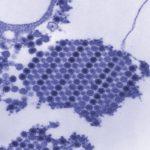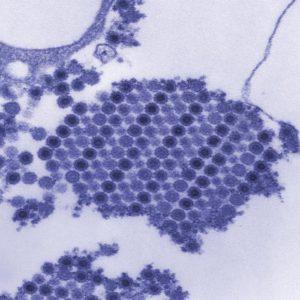A team of researcher from the University of Texas Medical Branch have developed a Chikungunya virus (CHIKV) vaccine candidate that uses an insect virus, known as Eilat virus, as the vaccine platform. The vaccine showed strong efficacy and safety in animal studies and therefore is a good candidate for further trials in humans.
CHIKV is the virus which causes Chikungunya fever. The infectious disease has symptoms including polyathraligia (joint pain). This pain can remain for more than 60 years in an individual and therefore the disease has a major impact on the infected individual’s lifestyle as well as the economies of affected communities. The virus is spread through mosquito bites and eradication has proven difficult without an effective vaccine.
The researchers created a CHIKV vaccine using an Eilat virus cDNA clone to develop a virus which included CHIKV structural proteins. Eilat virus is an insect virus which was isolated from mosquitos. It is an enveloped virus with an icosahedral shape which contains a single-stranded,positive-sense RNA genome. The virus is unable to infect humans and therefore is a good choice for a vaccine platform.
The insect virus-based CHIKV vaccine closely resembled wild-type CHIKV and was able to replicate efficiently in mosquito cells. The vaccine candidate was not able to replicate in vertebrate cells which further validated its safety in humans.
The vaccine candidate produced robust immune responses and protected two different mouse models and nonhuman primates from infection. A single dose of the vaccine was able to elicit long-lasting neutralizing antibodies within 4 days of the dose.
In summary, this study is the first to produce a vaccine that has gone to pre-clinical trials that is based on an insect virus. Further validation of this vaccine candidate must occur in human trials and if successful, this may be the first licensed CHIKV vaccine.
Journal Article: Erasmus et al., 2016. A chikungunya fever vaccine utilizing an insect-specific virus platform. Nature Medicine
Article by Thandeka Moyo

